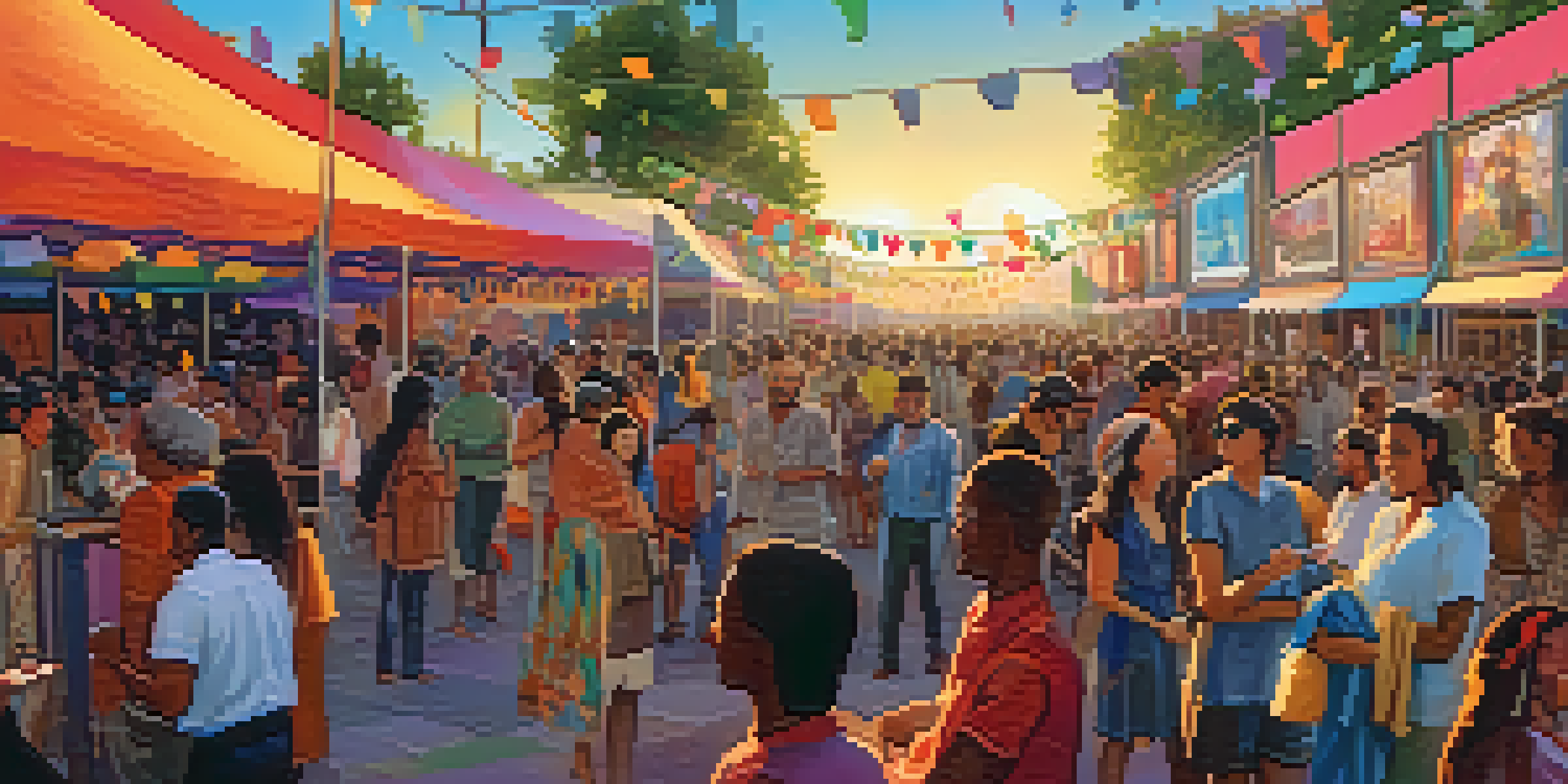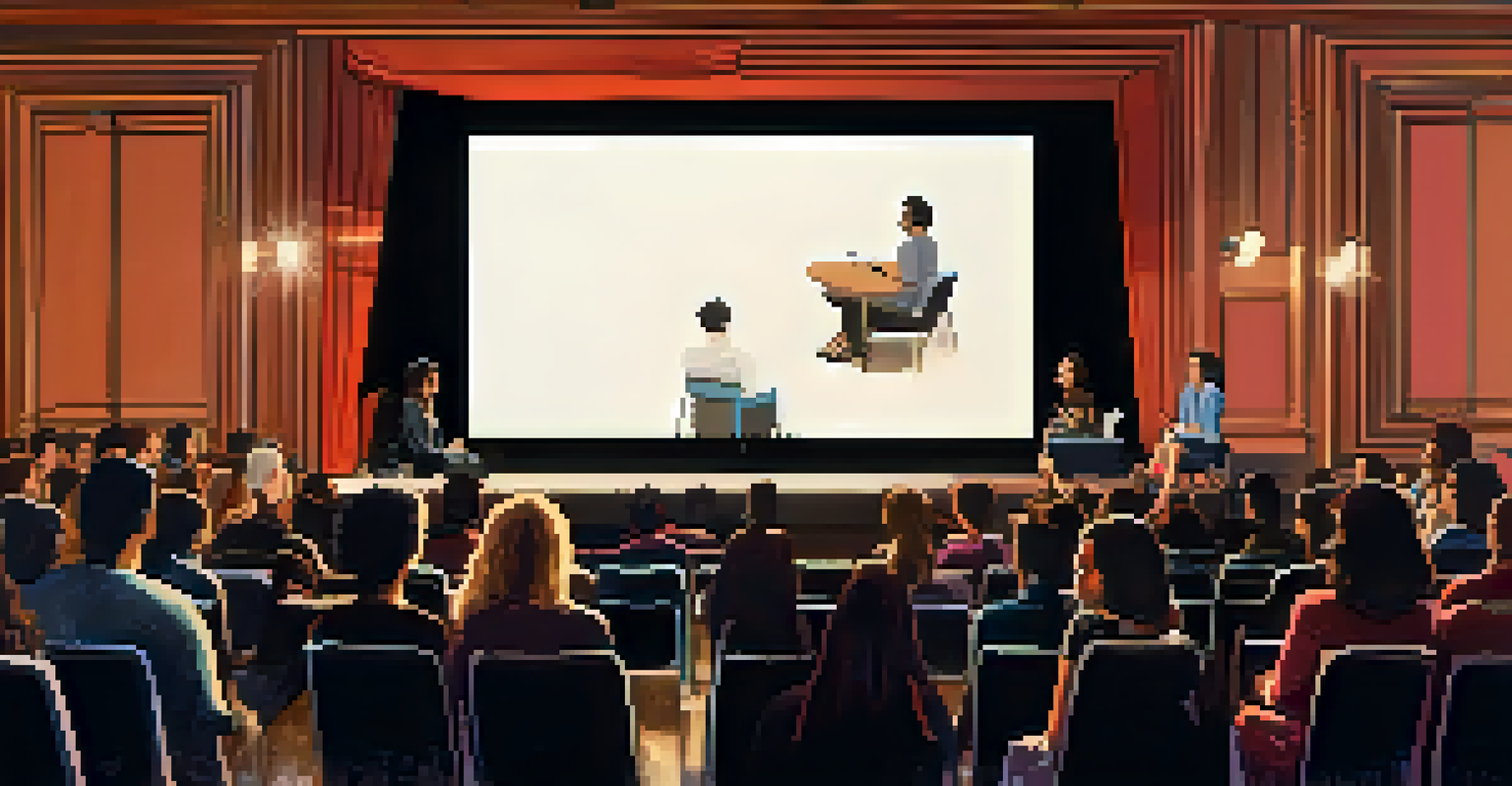The Role of Film Festivals in Promoting Diverse Voices

Understanding the Importance of Film Festivals
Film festivals are more than just events; they are cultural milestones that celebrate creativity and storytelling. They provide a unique platform for filmmakers to showcase their work to a broader audience, often highlighting narratives that might be overlooked in mainstream cinema. By focusing on diverse voices, these festivals create spaces where underrepresented groups can share their stories and experiences.
Film festivals are a celebration of creativity and a platform for diverse voices that often go unheard.
For many filmmakers, especially those from marginalized communities, film festivals can be crucial in gaining visibility. This exposure not only connects them with audiences but also opens doors for future projects and funding opportunities. In this way, festivals play a key role in fostering a more inclusive film industry.
Moreover, the atmosphere of a festival encourages dialogue and interaction among filmmakers, critics, and audiences. This exchange of ideas is essential for understanding different perspectives and experiences, further enriching the cinematic landscape.
Spotlighting Underrepresented Filmmakers
One of the most significant contributions of film festivals is their ability to spotlight underrepresented filmmakers. Many festivals actively seek out diverse voices, creating dedicated categories or awards for films that reflect various cultures, identities, and experiences. This commitment not only amplifies these voices but also encourages filmmakers to tell their stories authentically.

Consider festivals like Sundance or Toronto International Film Festival, which have made strides in promoting films by women and people of color. These platforms not only showcase their work but also validate their experiences and perspectives. By prioritizing diversity, these festivals help reshape the narrative in the film industry.
Celebrating Diverse Filmmakers
Film festivals spotlight underrepresented filmmakers, amplifying their voices and stories to enrich the cinematic landscape.
Ultimately, highlighting underrepresented filmmakers fosters a sense of community and belonging among creators. It sends a powerful message that all stories matter and deserve to be told, paving the way for future generations of diverse filmmakers.
Fostering Cultural Exchange Through Film
Film is a universal language, and festivals harness its power to foster cultural exchange. By showcasing international films, festivals allow audiences to experience different cultures, traditions, and worldviews. This exposure is invaluable, as it cultivates empathy and understanding in an increasingly polarized world.
Cinema is a mirror by which we often see ourselves and those around us; film festivals help to expand that reflection.
For instance, festivals often feature films that explore social issues specific to certain regions, prompting discussions about global challenges. By engaging with these narratives, audiences can gain insights into the struggles and triumphs of others, fostering a sense of global solidarity.
In this way, film festivals act as bridges between cultures, encouraging dialogue and collaboration. They remind us that, despite our differences, storytelling is a shared experience that connects us all.
Creating Opportunities for Emerging Talent
Film festivals serve as launchpads for emerging talent, providing them with opportunities to showcase their work and network with industry professionals. Many festivals offer workshops, panels, and mentorship programs that equip new filmmakers with the skills and knowledge they need to succeed. This support is particularly vital for those from underrepresented backgrounds who may not have access to traditional pathways into the industry.
For example, the Tribeca Film Festival has initiatives aimed at nurturing young filmmakers, helping them develop their craft and connect with established professionals. By providing a platform for emerging talent, festivals are not just promoting diversity but also ensuring the future of storytelling remains vibrant and inclusive.
Fostering Cultural Exchange
By showcasing international films, festivals promote empathy and understanding through cultural exchange.
These opportunities can lead to further projects, collaborations, and even distribution deals, significantly impacting a filmmaker's career trajectory. As more diverse voices enter the industry, the richness of storytelling continues to expand.
Engaging Audiences in Meaningful Dialogue
Film festivals are not just about watching films; they are about sparking conversations. Many festivals incorporate Q&A sessions with filmmakers, allowing audiences to engage directly with the creators. This interaction fosters a deeper understanding of the themes and issues explored in the films, encouraging viewers to reflect on their own perspectives.
By facilitating these discussions, festivals create a safe space for dialogue on sensitive topics such as race, gender, and identity. Audiences are invited to confront their biases, challenge stereotypes, and broaden their worldviews, leading to meaningful conversations that extend beyond the festival.
In this way, film festivals become catalysts for social change, using the power of storytelling to inspire action and advocacy. They remind us that cinema can be a powerful tool for reflection and empowerment.
Building a Community of Support and Collaboration
Film festivals are more than just venues for screening films; they are communities of support and collaboration. They bring together filmmakers, critics, and audiences who share a passion for storytelling, creating an environment where relationships can flourish. This sense of community is especially important for diverse voices that may feel isolated in a predominantly homogeneous industry.
By fostering connections and collaborations, festivals encourage filmmakers to share resources, ideas, and experiences. This collaborative spirit can lead to innovative projects that might not have emerged within traditional structures. It exemplifies the idea that together, diverse voices can create something powerful.
Supporting Emerging Talent
Film festivals serve as launchpads for new filmmakers, providing networking opportunities and resources to help them succeed.
Moreover, these communities often extend beyond the festival itself, leading to ongoing support networks for filmmakers. As a result, the impact of film festivals goes far beyond a single event, contributing to a more inclusive and vibrant film ecosystem.
The Future of Film Festivals and Diversity
As the film industry continues to evolve, the role of festivals in promoting diversity remains crucial. With the rise of streaming services and digital platforms, filmmakers now have more avenues to showcase their work. However, festivals still hold a unique position in highlighting diverse narratives and fostering community engagement.
Many festivals are adapting to the changing landscape by incorporating hybrid models that blend in-person and virtual experiences. This shift not only increases accessibility but also allows for a wider range of voices to be heard. The future of film festivals lies in their ability to embrace change while staying committed to diversity.

Ultimately, as audiences become more aware of the importance of representation, festivals that prioritize diverse voices will continue to thrive. They will remain essential in shaping the future of cinema, ensuring that all stories have a place in the spotlight.